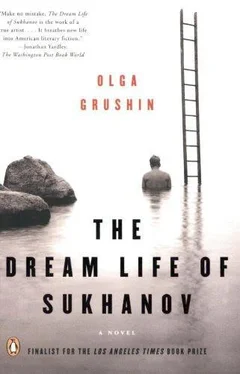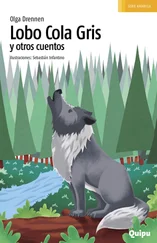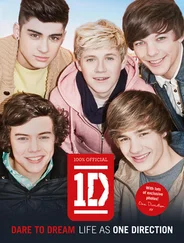When we parted later that day, I did not go home. Drunk with happiness, I walked the streets of Moscow, watching the darkness fall, watching windows pop up one after another and then go out, watching the sky grow thinner. When the first gray light touched the rooftops, the city unexpectedly rustled with a warm summer rain, and laughing, I ran to a nearby bus stop and waited in its glass-walled shelter. Half an hour passed, and still the rain gave no sign of abating. Realizing how close I was to the institute, I made a dash through the downpour and minutes later burst into the building.
Once in my studio, I immediately succumbed to the temptation of the virgin canvas that was stretched on my easel, for a certain image had haunted me all night—a lake, a boat, and in it, a woman—a demure, radiant nude with breasts, arms, and legs sprouting flowers, hundreds, thousands, myriad blue and white flowers whose fresh, fragrant profusion was gradually transformed into the blue, sun-dappled water on which the boat was floating gently. As I painted, I grew oblivious of the world around me—a hubbub of voices in the corridor, a patter of rain on the windowsill, a brisk knock on the door, a heavy step, a voice saying importantly, “There is a certain issue I need to discuss with you, Anatoly Pavlovich….”
Then, glancing up sharply, I saw a balding man entering the room, his red face stony, his thumbs hooked in the pockets of his jacket. It took me a heartbeat to recognize Leonid Penkin, the institute director—and instantly I became aware of my unshaved chin, my rain-drenched clothes, the circles under my eyes, a possibly missed morning lecture, and worse yet, a bare breast quite visibly materializing under my brush amidst a torrent of bluebells. With scarcely a nod for a greeting, the director commenced striding back and forth across the floor, staring majestically somewhere over my head and talking—talking about certain rumors that had reached him, certain, so to speak, artistic gatherings in a certain questionable home that I surely knew about, certain actions, moreover, that he would very much regret to have to undertake in certain contingencies…. Praying that he would fail to notice my painting, I hardly listened to his vociferous rhetoric.
“The way I see it,” he was saying, “socialist art is like a fast train into the future, and I, for one, would be rather sorry to see someone with your potential get off that train, for let me tell you, young man, it’s the only train there is. But I’m afraid you must get off if… Are you listening to me? You must get off if you don’t produce a ticket this instant!”
“A ticket?” Sukhanov repeated in confusion. “What ticket?”
“I thought as much,” said the man, and pushed his red face closer to Sukhanov’s. “A stowaway! Well, time to take a walk. Unless, of course, you want to pay a fine. Pay up, or get off.”
The people around them murmured excitedly. Through his broken glasses, Sukhanov peered outside and saw another badly lit platform without a name, disconcertingly similar to the one he had left dreams and dreams ago, in Bogoliubovka. Shuddering, he said, “All right, all right, how much?” and hastily reached inside his pocket. He felt some loose change rolling behind the lining, but his wallet was not there. His wallet, he suddenly remembered with a sinking heart, was in a side compartment of his bag, and his bag—his bag had been stolen.
His voice trembling now, he tried to explain his predicament to the conductor, offering what coins he had, swearing he would send the rest of the money in the mail, even humiliating himself by announcing that he was a very influential man, Anatoly Pavlovich Sukhanov, the editor in chief of the magazine Art of the World. “And I’m the editor of Pravda,” said a snickering voice in the crowd, “but I still buy me a ticket.” The train exploded with ugly, malicious laughter, and the conductor grasped Sukhanov’s shoulders and unceremoniously prodded him toward the door. In the quickly disintegrating mob behind him, he thought he saw the ancient man who had sat beside him earlier, now standing on the bench and frantically shouting something over the sea of heads; but his words were swallowed in the multi-throated roar, and in the next moment Sukhanov was rudely bundled off onto the empty platform. With a parting whistle, the train pulled away, all of its windows swarming with scowling, triumphant demons.
For a while after, Sukhanov stumbled up endless flights of stairs and trod along echoing passageways, emerging finally on a wide street, with a row of identical apartment buildings on one side and a park on the other. It looked like a big city. For a long time he waited aimlessly inside a glass-walled shelter by the road. (Hadn’t he done this recently? He could not remember.) Eventually the darkness parted with a squeal of tires, and a rectangle of concentrated yellow light, bobbing with more demonic faces at the windows, rolled up and slid open its doors. He stuck his head inside and inquired weakly, addressing no one in particular, “What city is this, please?”—but in reply received only hooting and someone’s carelessly phrased advice on public drunkenness. He was about to edge away, when a man seated by himself up front took a closer look at him and asked him where he wanted to go.
“Moscow,” Sukhanov said. The demons mocked him gleefully, but the man up front did not laugh. His face was not like the others, and his middle-aged eyes were sad.
“Where in Moscow?” he asked after the demons had quieted behind his back. It appeared that the train had deposited Sukhanov on the western outskirts of the capital; and while the metro was not yet running, the man told him, all he needed to do was take night bus number 403 to Krylatskoe and there switch to the number 13 going directly to the Tretyakovskaya station. “Just wait here,” said the man, glancing at his wrist. “There’ll be a 403 coming any minute.”
“You are very kind,” Sukhanov said humbly.
“Hell, I’ve been there myself,” the man replied, shrugging.
The doors closed, and the rectangle of light moved off into the shadows.
It must have been close to six in the morning when Sukhanov was finally spat out by the last bus into the reassuringly familiar landscape of the Zamoskvorechie. The city was still dark, the never-ending night still upon him. Almost swooning with sleep, he walked along Bolshoi Tolmachevsky Lane, and the echo of his solitary steps reverberated hollowly off aged walls. Through an open window, the faint sound of a radio reached him—many voices, remote and muffled like the buzz of an insect throng, singing the Soviet anthem, proclaiming the indestructible union of the free republics. He turned the corner, and the sprawling form of the Tretyakovskaya Gallery loomed into sight. Quickening his steps, he walked toward it, passed the main entrance, and approached a metal side door bearing the sign “Keep Out: Staff Only” When he pushed the door, it gave way soundlessly, just as she had promised. Stepping inside, he barely had time to register that singular museum smell of light dust, parquet polish, and old paper, when his elbow was seized by a swift hand, and Nina’s tense face emerged from the dimness.
“Did anyone see you come in?” she whispered as she locked the door behind him.
He shook his head and tried to pull her toward him for a kiss.
“Not now,” she said. “It’s almost six o‘clock, we must hurry. Come, this way.”
We tiptoed through labyrinths of nondescript corridors, some lined with dank black pipes, others concealing bookcases in unexpected recesses. Once a red-and-white Saint George pointed a lance directly at my chest from a poster that had materialized in the air, hanging on a column that I could not see, that might not have even been there; and in another minute I almost screamed when the darkness hobbled toward us, gradually assuming the guise of a grinning custodian dragging behind a dried-out mop. “My respects, Nina Petrovna,” said the museum’s resident ghost, and after Nina pressed something into his proffered hand, shuffled back into the limbo whence he had come. I followed him with uneasy eyes.
Читать дальше








![Theresa Cheung - The Dream Dictionary from A to Z [Revised edition] - The Ultimate A–Z to Interpret the Secrets of Your Dreams](/books/692092/theresa-cheung-the-dream-dictionary-from-a-to-z-r-thumb.webp)



